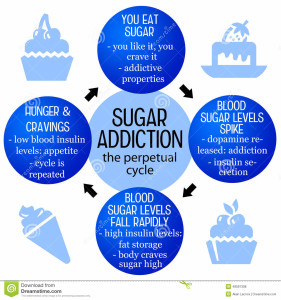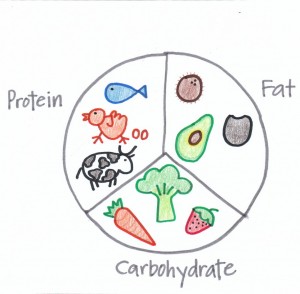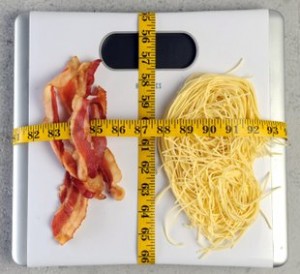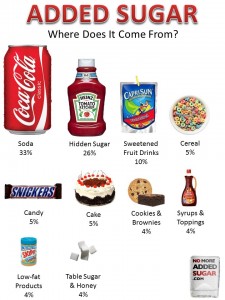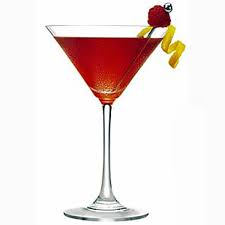You’ve heard it over and over: Sugar is bad for you.
The more you have of it, the more you crave it. More than likely, the images that this statement conjures up include ice cream cones, candy bars and powdered donuts. But sugar is far more deceptive than to just find it’s way into your favorite sweet treat.
The problem is sugar is hidden in many foods you would not think included it! Here’s a recap of the show I did with Michelle Davidson and Joel Nichols about hidden sugars and their adverse effect on our health and well being.
Here’s more information about the adverse effects of sugar that wasn’t on the show.
The Truth: The adverse affects of sugar on the body run much deeper and dangerous than addiction and fat accumulation. While every individual is unique—meaning that the reason for your cravings may have to do with biological factors that are different for every person–what happens with sugar in the body follows a pretty basic formula:
When the body is constantly struggling to get this balance right, the demand for insulin release is TOO MUCH which ultimately results in our blood sugar dropping below normal levels. This is called hypoglycemia, aka…a sugar crash. We then consume more and the process starts again.
So you get it. The damaging affects of sugar begin with things like food cravings, food addictions, sugar crashes, depressed mood, fatigue, and irritability.
What exactly happens with that extra sugar?? It doesn’t just go away. It gets stored as fat. Storing fat isn’t just about your pants getting tight.
Here is what you may not know:
Sugar is made up of glucose and fructose. Glucose is cool because every cell in your body can metabolize it for energy. Fructose is unique because only the liver can break it down. There’s a whole lot more fructose hidden in the foods we eat than there is glucose. This one organ is doing all the work to metabolize the overabundance of fructose in the diet! It’s also the organ responsible for turning that unused sugar into fat deposits in your body.
WHAT’S BAD ABOUT THE FAT?? Excessive sugar causes the liver to make fat AND becomes insulin resistant! Then the danger escalates. Insulin is a hormone and if it’s not getting used, it gets turned to FAT too! Eventually, the pancreas stops releasing insulin because it can’t keep up with the demand either.
THEN WHAT?? Basically the body is in a state of crisis or chronic inflammation. 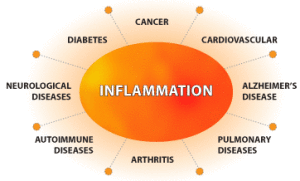
Those processed foods and too much sugar created a toxic environment in your body. So you signed up for T School and started the process of deoxing from sugar. Just taking sugar away isn’t the only factor involved in reversing the toxicity. It’s what you add in!
Food is your anti-inflammatory! Did you know that every food has a pH value?
This is a specia
It’s no surprise that the most highly acidic foods are sugar and refined, processed foods. When you do a detox from sugar, you are consuming foods that are highly alkalinic. The overly acidic environment is thus counteracted.
Here’s an awesome chart that shows what foods are alkaline or acidic! Click here to print your copy!
Not surprising, most fruits, vegetables and nuts are alkalizing! Some foods ARE really surprising! Did you know a lemon is actually highly alkalinic INSIDE the body?
Your body was meant to maintain a pH level between 7.35-7.45, so with every bite of food, you literally change the chemical make-up of your body! This will change depending on what foods/drinks you take in. Foods either maintain health(higher alkaline intake) or produce disease (higher acidic intake).
Wanna actually see your pH level? Test your pee! It will show the pH level in your body! This level will change depending on what foods/drinks you take in.
To test, you can actually buy Litmus strips at your local pharmacy or here. You simply dip a strip in a sample of your urine! The best times to check is your first and second urine of the day. Anything over 7.0 is alkaline. Anything under 7.0 is acidic. You should fall somewhere between 7.35 – 7.45 on the pH scale which is slightly alkaline. Yes, I’ve tried it and it works!
The best choice to maintain that healthy balance is to choose to eat real food! Eating food in it’s most natural form means it isn’t pre-packaged or processed, so prepping for a meal takes a little more time and planning. Some tips to get you started:
- Start with small changes. Use a real food shopping list that you can simply check off the items you are going to buy for the week, like this one. Choose one day a week to prep food. Keep the prep simple like grilling chicken and chopping a few vegetables to add in salads and soup.
- Learn a few simple recipes. Fewer ingredients and less cooking time is the way to go. If it takes over 30 minutes, save it for a special weekend meal! One pot meals, hearty salads and grilling fish and chicken are great examples.
- Don’t get stuck in a food rut! You don’t have to eat the exact same thing at every meal. Try different herb seasonings or salad dressings, or add different vegetables to your favorite meals.
- Use what is convenient! If you don’t have time to chop vegetables, buy the pre-cut. Buy frozen vegetables instead of fresh when you’ve got less time for prep. Trader Joe’s frozen riced cauliflower is a great example. You can use it in so many ways, but don’t have to do the cutting. Take advantage of pre-made meals that fall in line with your clean eating plan, like Caleb’s Evolve Paleo Chef!
- Balance Your Meal! The easiest way to ensure you are getting a good balance of the nutrients your body needs is to aim for one protein and two colors of vegetable with each meal!



